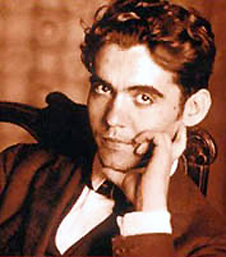So, after the weekend-long break my university thought was long enough to recover from self-esteem-destroying exams, I was back in early at 10am for my first class of the new semester. Thanks...
I have learnt my lessons from last semester, though. NOTHING with the word "Comentario" or taught by Consolación Baranda Leturio should EVER be studied by a foreigner. Avoid novel courses (although one does require I read five: but that's for the sake of analysing the film adaptations). Finally decide if I can a) understand; b) hear; and c) like the teacher before submitting any forms: I have a month.
Considering this, it's been quite easy deciding which courses I'll be studying, this time around. On Mondays and Tuesdays I'm on campus for eight hours studying everything about the Latin American short story and theatre of the twentieth century; delving into the theatre of the Spanish Golden Age; and browsing the world of Women's Literature withing the wider Spanish spectrum. As for Thursdays and Fridays, life is a litte easier, with Spanish Literature and Film, and the Latin American Essay being studied. It seems my main interests are Theatre (no surprise there, then), and Latin American literature.
One of my own students (how else do you think I can afford all those high-class gigolos?) told me he's not surprised I've been slightly turned off from Spanish literature. He's of the opinion that what is currently in vogue among the academic elite is, frankly, dull. Of course, there are some writers who are considered Gods among men: Cervantes, Lope de Vega, Jorge Luis Borges and Horacio Quiroga are never far away; but there is already a lot said about them. Even considering these men, plenty can be inferred about the state of current academic literary pursuit in this country: Quiroga was born in Uruguay, Borges in Agrentina, and all of them are long dead.
The truth of Spanish literature is that what is considered "good" among the professors is boring, hard to read, or overly-meticulous. There is in fact a word used to sum this up perfectly: pesado (unbearably heavy). This isn't my opinion, but that of my Spanish classmates. The other day, I was chatting with a group of them, and it turns out most of them had read more English and American literature than I or most of us English students probably have. Isn't that so sad? I personally think there are plenty of good Spanish writers past and present: Carmen Martín Gaite, Ana María Matute, Miguel Unamuno, Miguel Mihura, José Luis Alonso de Santos, Alejandro Casona, Gustavo Adolfo Bécquer, and everyone's favourite Federico García Lorca. But where are they in the syllabi (or syllabuses: either is acceptable, according to Oxford)?
There is currently a crisis in Spanish Education, in part due to the Bologna Process, but also with regard to students' choices of degrees. My advice to the teachers is to re-think their curricula: good can also be interesting and even popular, you know...
I have learnt my lessons from last semester, though. NOTHING with the word "Comentario" or taught by Consolación Baranda Leturio should EVER be studied by a foreigner. Avoid novel courses (although one does require I read five: but that's for the sake of analysing the film adaptations). Finally decide if I can a) understand; b) hear; and c) like the teacher before submitting any forms: I have a month.
Considering this, it's been quite easy deciding which courses I'll be studying, this time around. On Mondays and Tuesdays I'm on campus for eight hours studying everything about the Latin American short story and theatre of the twentieth century; delving into the theatre of the Spanish Golden Age; and browsing the world of Women's Literature withing the wider Spanish spectrum. As for Thursdays and Fridays, life is a litte easier, with Spanish Literature and Film, and the Latin American Essay being studied. It seems my main interests are Theatre (no surprise there, then), and Latin American literature.
One of my own students (how else do you think I can afford all those high-class gigolos?) told me he's not surprised I've been slightly turned off from Spanish literature. He's of the opinion that what is currently in vogue among the academic elite is, frankly, dull. Of course, there are some writers who are considered Gods among men: Cervantes, Lope de Vega, Jorge Luis Borges and Horacio Quiroga are never far away; but there is already a lot said about them. Even considering these men, plenty can be inferred about the state of current academic literary pursuit in this country: Quiroga was born in Uruguay, Borges in Agrentina, and all of them are long dead.
The truth of Spanish literature is that what is considered "good" among the professors is boring, hard to read, or overly-meticulous. There is in fact a word used to sum this up perfectly: pesado (unbearably heavy). This isn't my opinion, but that of my Spanish classmates. The other day, I was chatting with a group of them, and it turns out most of them had read more English and American literature than I or most of us English students probably have. Isn't that so sad? I personally think there are plenty of good Spanish writers past and present: Carmen Martín Gaite, Ana María Matute, Miguel Unamuno, Miguel Mihura, José Luis Alonso de Santos, Alejandro Casona, Gustavo Adolfo Bécquer, and everyone's favourite Federico García Lorca. But where are they in the syllabi (or syllabuses: either is acceptable, according to Oxford)?
There is currently a crisis in Spanish Education, in part due to the Bologna Process, but also with regard to students' choices of degrees. My advice to the teachers is to re-think their curricula: good can also be interesting and even popular, you know...










Try reading some Eduardo Mendoza or Quim Monzo, for the laughs...
ReplyDelete